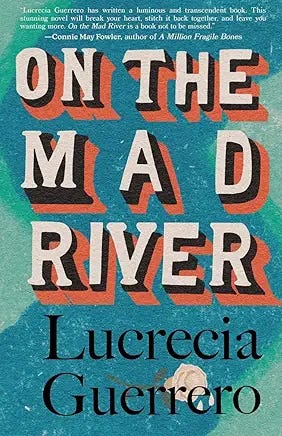It’s fate, Rosa Linda del Rio decides when, trying to decide where to go, she finds a one-way bus ticket to Mad River, Ohio in an envelope tucked behind the toilet tank in the Greyhound Station in Nopal, Arizona—along with a note that says, “YOUR LUCKY DAY FREE I DON’T NEED IT NO MORE”.
She’s leaving her boyfriend Cisco, a decent man but one who “loved what he wanted her to be—the Madonna/housewife his mother had wished for him”. Barely out of high school, Rosa Linda wants more than that from life, she dreams of becoming an actress.
She tells herself that once she’s made it, she’ll return the switchblade knife she stole from him to protect herself, along with the ten fifty-dollar bills tucked into a secret compartment of the battered suitcase she’s carried from relative to relative since her parents abandoned her years ago.
She steps down from the Greyhound in Mad River in the predawn gloom and heads for a nearby diner where she slides into a booth and orders a cherry Coke. She can’t sit in a booth unless she orders a meal, the waitress says. But Rosa Linda doesn’t want to open her suitcase for fear the creepy guy who’s been watching her since she came in will see she has money. To her dismay, he slides in across from her and orders, offering her part of his breakfast, which she’s so hungry she can’t help eating.
Enon is his name. When he says he’s on his way to Chicago, she remembers visiting an aunt there—“the heartbeat of the city, tall buildings [that] reached for the moon and stars’’—and says, “What a coincidence, that’s where I’m headed.”
After all, it had been one of the cities she considered before she found the ticket to Mad River.
Rosa Linda knows she shouldn’t get into a car with a strange man. But, puffed up with her new independence, she does it anyway.
Donnie Ray Camper has lived in Mad River all his life, in Hillbilly Holler, a neighborhood populated by people from Kentucky and Tennessee who’d come for once plentiful factory jobs. Now it’s in the process of being eaten up by gentrification, things he remembers from his childhood disappearing.
He’s grieving the death of his younger brother Shayne, determined never again to love anyone whose loss would be so devastating—though, lately, he finds himself increasingly drawn in by his kindhearted, optimistic girlfriend Tara.
I won’t say what happens between Rosa Linda and Enon, just that she’s lucky to get away from him and ends up back in Mad River, at Melva’s Bar and Restaurant, where Melva offers her room and board and a small salary to take care of her husband Eddie who’s suffering from dementia.
When Donnie Ray appears at the restaurant, there’s an instant connection.
“‘Too old for you, missy—he’s got to be thirty if he’s a day,’” Melva [says], “‘and double that in experience.”
At which point, you know something is going to happen between them.
And it does. But I’m guessing it will surprise you as it surprised me.
On the Mad River is not a romance, it’s not a book about a poor, abandoned girl who finds a family, it’s not a cautionary tale.
It’s a bit of a thriller: Enon returns. (I’ll leave it at that.)
Mainly, though, it’s a tender story of two very different people, each at a crossroads in their life, who form an unlikely alliance that changes them both for the better.
This tenderness, along with the respect and honesty with which Guerrero depicts the lives and dreams of working-class people, has made On the Mad River stay with me longer than most books do.




I loved that book. It got under my skin and stayed, and I still think about it when I pass my bookshelf. And it is a thriller!